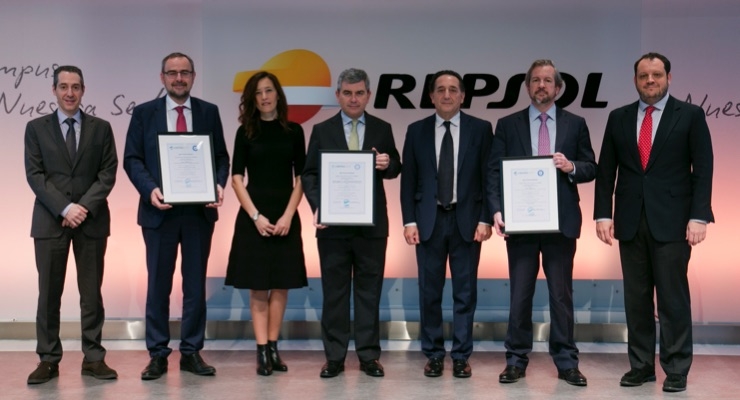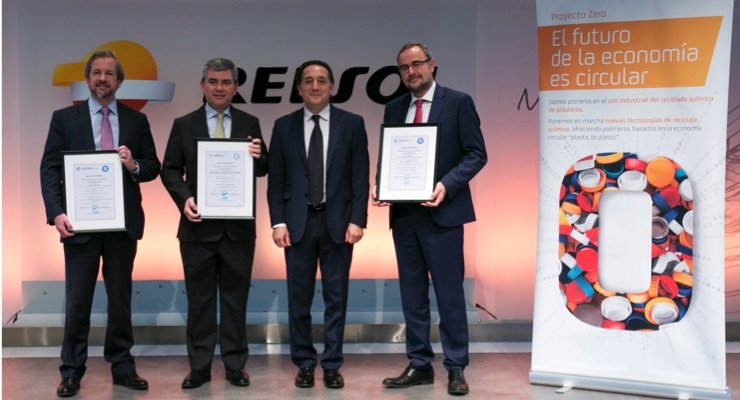03.02.20
In line with its sustainability objective and the commitment of the chemical business to the circular economy, Repsol certified all its complexes for the production of polyolefins and other petrochemical products as circular.
In this way, Repsol approaches its commitment to reach 20 percent of the total polyolefins produced with recycled content by 2030.
The industrial complex in Puertollano obtained the ISCCPLUS certification at the end of 2019. The rest of its polyolefin production centers are now also included under this certification.
The ISCC PLUS certification allowed Repsol to launch its first circular polyolefins at the end of 2019. This certification also enables to market other products such as styrene, polyols, and glycols as circular.
Repsol obtains its circular polyolefins by replacing part of the conventional raw material with oil from the chemical recycling of plastic waste not suitable for mechanical recycling.
After the certification of its industrial complex in Puertollano at the end of 2019, Repsol accomplishes another milestone in its commitment to boost the circular economy of its materials, by obtaining the ISCC PLUS certification for the rest of its polyolefin production centers.
By certifying its Tarragona and Sines complexes, Repsol reaffirms its leadership, being the first petrochemical company to certify all its complexes for the production of circular polyolefins.
The certificates were handed out on Feb. 14, 2020, to José Luis Bernal, executive director at Repsol Química, by Fabián Campillay, executive director of Control Union España.
“Our commitment to the circularity of our materials began long ago when in 2015 we began to experimentally feed oil from chemical recycling of plastic waste, becoming the first company to do it on an industrial scale," Bernal said. "This new milestone reaffirms our leadership and commitment to circular polyolefins. A commitment that we already made public last October when we obtained the ISCC PLUS certification in our Puertollano complex and that allowed us to offer our customers in Europe the first tons of circular polyethylene and polypropylene.”
To produce circular polyolefins, Repsol feeds, as an alternative raw material, oil obtained from the use of plastic waste not suitable for mechanical recycling.
This new raw material is fed alongside conventional raw material, reducing the consumption of non-renewable resources.
This certification guarantees the traceability of the plastic waste used at the source and, at the same time, offers the same quality and functionality of virgin polyolefins.
This way, Repsol provides its customers with a portfolio of products with recycled material for applications that demand high standards of hygiene and safety, ideal for food packaging.

Pictured (L-R): José Antonio Albalá, senior business development manager; Rafael Jiménez, Polyolefins BU director at Repsol; Adelaida Alarcón, certifications director at Control Union España; José Luis Bernal, executive director at Repsol Química; Fabián Campillay, executive director at Control Union España; Antonio Portela, Intermediates BU director at Repsol; Sergio Gómez, director of Strategy, Innovation and Control at Repsol.

Pictured (L-R): Portela; Bernal; Campillay; Rafael Jiménez, director UN Poliolefinas Repsol.
In this way, Repsol approaches its commitment to reach 20 percent of the total polyolefins produced with recycled content by 2030.
The industrial complex in Puertollano obtained the ISCCPLUS certification at the end of 2019. The rest of its polyolefin production centers are now also included under this certification.
The ISCC PLUS certification allowed Repsol to launch its first circular polyolefins at the end of 2019. This certification also enables to market other products such as styrene, polyols, and glycols as circular.
Repsol obtains its circular polyolefins by replacing part of the conventional raw material with oil from the chemical recycling of plastic waste not suitable for mechanical recycling.
After the certification of its industrial complex in Puertollano at the end of 2019, Repsol accomplishes another milestone in its commitment to boost the circular economy of its materials, by obtaining the ISCC PLUS certification for the rest of its polyolefin production centers.
By certifying its Tarragona and Sines complexes, Repsol reaffirms its leadership, being the first petrochemical company to certify all its complexes for the production of circular polyolefins.
The certificates were handed out on Feb. 14, 2020, to José Luis Bernal, executive director at Repsol Química, by Fabián Campillay, executive director of Control Union España.
“Our commitment to the circularity of our materials began long ago when in 2015 we began to experimentally feed oil from chemical recycling of plastic waste, becoming the first company to do it on an industrial scale," Bernal said. "This new milestone reaffirms our leadership and commitment to circular polyolefins. A commitment that we already made public last October when we obtained the ISCC PLUS certification in our Puertollano complex and that allowed us to offer our customers in Europe the first tons of circular polyethylene and polypropylene.”
To produce circular polyolefins, Repsol feeds, as an alternative raw material, oil obtained from the use of plastic waste not suitable for mechanical recycling.
This new raw material is fed alongside conventional raw material, reducing the consumption of non-renewable resources.
This certification guarantees the traceability of the plastic waste used at the source and, at the same time, offers the same quality and functionality of virgin polyolefins.
This way, Repsol provides its customers with a portfolio of products with recycled material for applications that demand high standards of hygiene and safety, ideal for food packaging.

Pictured (L-R): José Antonio Albalá, senior business development manager; Rafael Jiménez, Polyolefins BU director at Repsol; Adelaida Alarcón, certifications director at Control Union España; José Luis Bernal, executive director at Repsol Química; Fabián Campillay, executive director at Control Union España; Antonio Portela, Intermediates BU director at Repsol; Sergio Gómez, director of Strategy, Innovation and Control at Repsol.

Pictured (L-R): Portela; Bernal; Campillay; Rafael Jiménez, director UN Poliolefinas Repsol.


